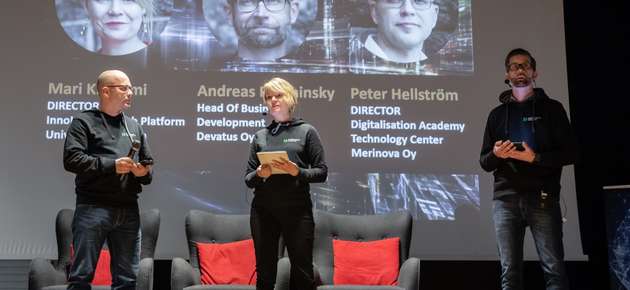Collaboration in Vaasa to grow into a national model – University of Vaasa to develop ...


“Digitalisation Academy is an example of dynamic cooperation between companies and universities. The companies in the VaasaEnergy cluster started to look for an out-of-the-box solution for their shortage of talented people, and universities were quick to join in developing the activities,” says Mari K. Niemi, Director of the InnoLab research platform.
In the first phase, the grant by the Ministry helps to standardise the model in Vaasa. The goal is to make the model as efficient and cost-effective as possible. Another goal is also to increase the number of companies and students that are involved in and benefit from the Academy.
“At the start of the project, our researchers will interview the parties, that is, the students, companies and universities, to learn about their experiences and desires. We will also investigate best practices from other parts of the world and the possibilities to build a long-term financing model for the Digitalisation Academy,” says Niemi.
As of today, Digitalisation Academy is a Vaasa-based innovation, but in the future, the goal is to spread it to other parts of Finland as well.
“We want to increase the appeal of the region and make more and more people with digital expertise committed to staying in Ostrobothnia. However, the project will influence all of Finland, because our task is to develop a model that can be applied in other parts of the country as well in order to tackle the shortage of people with digital expertise,” says Niemi.
The model is also used to attract international talent to Finland and improve the possibilities of international talent to stay in Finland to work for long term after they have finished their studies.
According to the, the project will create a new kind of operating model for employing university graduates in companies
“Responding to the shortage of talents with new models like the one in this project will also promote the development of innovation clusters and ecosystems with international networks in Finland”, says Ministerial Advisor Pirjo Kutinlahti from the Ministry of Economic Affairs and Employment.
Digitalisation Academy started in January
The first university students started their one-year education in Digitalisation Academy in January. The first initiative that lead to the creation of the Academy came from the software development company Devatus that recruited graduates of the universities in the region.
“We came up with the idea of a cross-disciplinary academic model where local companies participate in arranging education for students related to the latest technologies and the focus areas of the companies. This would help the companies to find talented people who are better prepared for the working life, and also it would be easier for the graduates of the academy to find employment in the local companies,” says the Head of Business Development Andreas Paschinsky from Devatus.
The director of the Digitalisation Academy, Peter Hellström from Merinova Technology Centre says that this year, the education in Digitalisation Academy focused on cyber security, data science and digitalisation, among other things. The partner companies take part in providing education. The flexibility provided by digitalisation is utilised in the education, and practical aspects are emphasised. For example, exercises and projects that the students do are as close as possible to real-world projects or problems faced by the companies involved.
Further information:
Mari K. Niemi, Director, InnoLab research platform at University of Vaasa, tel. xxxx, email: mari.k.niemi@uwasa.fi
Digitalisation Academy
- A joint model by the industry and universities that aims to find solutions to the shortage of talent in the digital sector
- Multidisciplinary education to the students of the universities in the Vaasa region with participation from partner companies.
- Started operating in January 2019.
- Participants include Wärtsilä, Danfoss, Devatus, Wapice, VEO, Vaasan Sähkö, KWH Logistics, and Mirka; and University of Vaasa, Vaasa University of Applied Sciences (VAMK), and Novia University of Applied Sciences
- Headed by Peter Hellström, Merinova Technology Centre
- In the initial phase, operations have been financed by the Regional Council of Ostrobothnia, and Merinova
- The InnoLab research platform hosted by University of Vaasa received a grant from the Ministry of Economic Affairs and Employment for the development and expansion of the Digitalisation Academy operating model.
- Read more: www.digitalisationacademy.fi